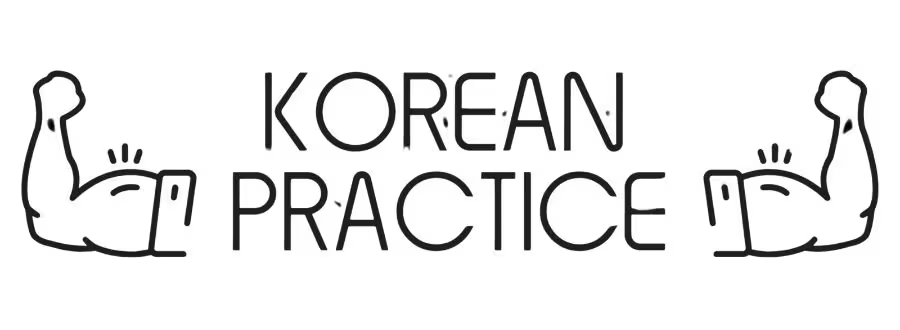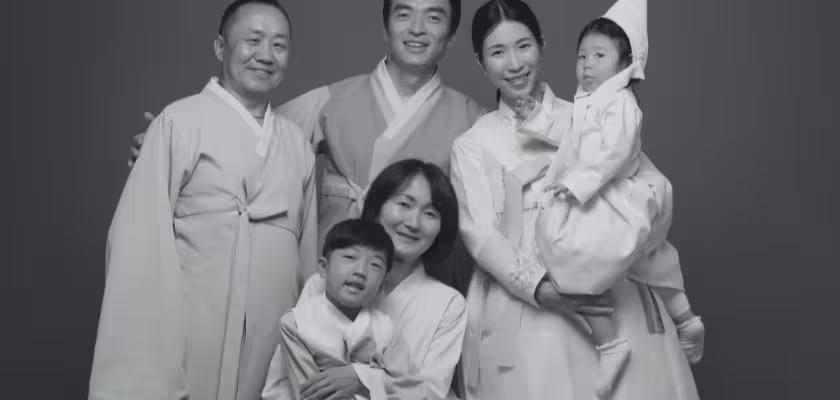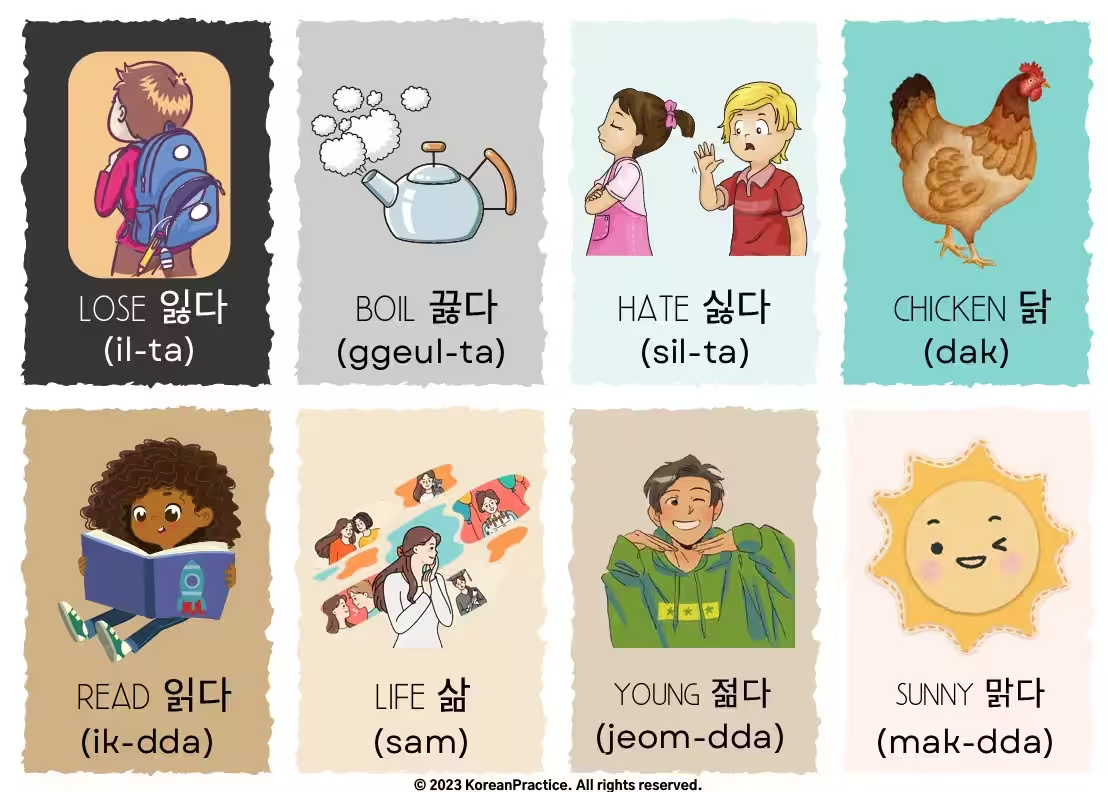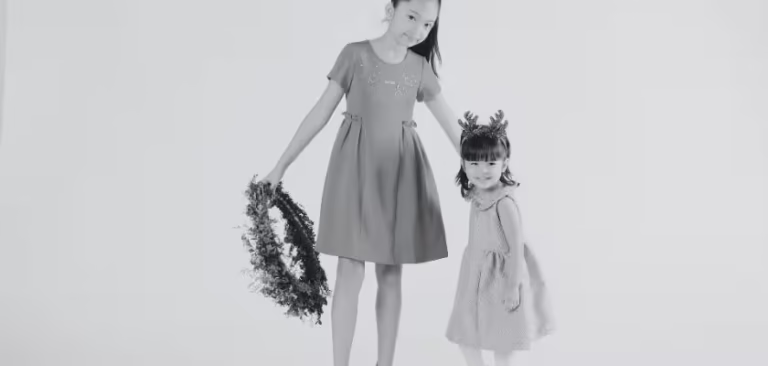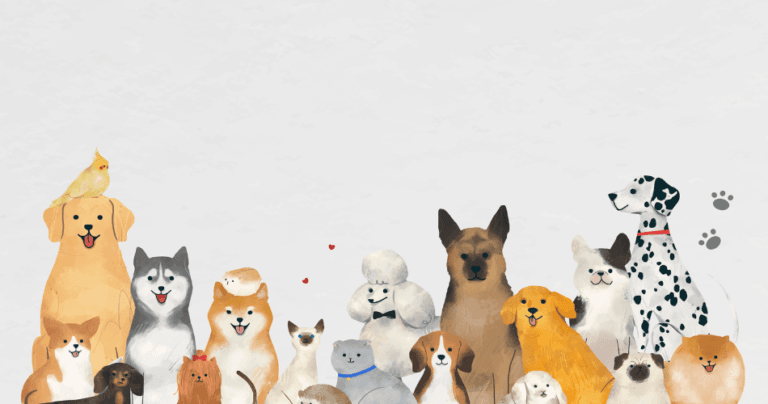Suh ChangWhoon
Written by 서 창훈, a certified Korean teacher with 14+ years of experience in Japan. He previously worked as a government officer, cybersecurity consultant, and English interpreter. Today, he teaches Korean in real classrooms without complex grammar explanations — instead, he trains students’ brains to speak naturally. His unique method is now the foundation of all his Korean courses.
Table of Contents
Korean Words for Family Members
In Korean culture, family bonds run deep, and each relationship within a family has a unique Korean terms for family that reflects not just kinship but also the hierarchy and level of respect.
Whether you’re learning Korean for travel, business, or simply to enjoy K-dramas, understanding family members in Korean can give you a deeper appreciation of the culture.
In this guide, we’ll cover everything from immediate Korean family words to extended relatives and in-laws, helping you navigate the complex yet beautiful language of family in Korean culture.
Korean Language Family Tree
In Korea, Korean terms for family often change depending on gender, age, and family side (maternal or paternal). Korean family vocabulary is hierarchical, reflecting respect and structure. For instance, how you address an older brother differs based on whether you are male or female. Let’s break down these details.
어머니
When learning Korean terms for family, the words for mom are essential. The formal term is 어머니 (eomeoni), often used in respectful situations, while 엄마 (eomma) is the casual, affectionate term commonly used in daily life.
Original Korean Sentence
제 어머니는 지금 집에 없어요.
Pronunciation Guide
제 (je) 어머니는 (eo-meo-ni-neun) 지금 (ji-geum) 지베 (ji-be) 업써요 (eop-sseo-yo).
Meaning and Context
제 (my; in a humble way) 어머니 (mother) 는 (my topic is my mother) 지금 (now) 집 (home) 에 (at) 없 (to be not) 어요 (is; I’m telling you polite and friendly).
English Translation
My mother is not home right now.
Literal Translation
My mother is not at home now.
아버지
Dad: “아버지” (abeoji) is formal, and “아빠” (appa) is informal.
Original Korean Sentence
아빠하고 같이 공원에서 놀았어요.
Pronunciation Guide
아빠하고 (a-bba-ha-go) 가치 (ga-chi) 공워네서 (gong-wo-ne-seo) 노랏써요 (no-rat-sseo-yo).
Meaning and Context
아빠 (dad) 하고 (with) 같이 (together) 공원 (park) 에서 (at) 놀 (to play) 았 (past tense) 어요 (I’m telling you polite and friendly).
English Translation
I played at the park with my dad.
Literal Translation
(I) played at park together with dad.
형
For males referring to their older brother, the right Korean family term is 형 (hyeong). This word expresses both respect and warmth in Korean culture.
Original Korean Sentence
형이 나에게 장난감을 줬어.
Pronunciation Guide
형이 (hyeong-i) 나에게 (na-e-ge) 장난까믈 (jang-nan-gga-meul) 줫써 (jweot-sseo).
Meaning and Context
형 (older brother for a male) 이 (I am going to talk about my older brother) 나 (me) 에게 (to) 장난감 (toy) 을 (my object is a toy) 주 (to give) 었 (past tense) 어 (I’m telling you casually).
Pronunciation Patterns for Conjugations
⊳ 주 + 었 = 줬
When rapidly pronounced, ‘주’ and ‘었’ naturally combine to form ‘줬’.
English Translation
My older brother gave me a toy.
Literal Translation
(My) older brother gave toy to me.
오빠
In Korean terms for family, females call their older brother 오빠 (oppa). This term is also often used as an affectionate nickname for older male friends or boyfriends.
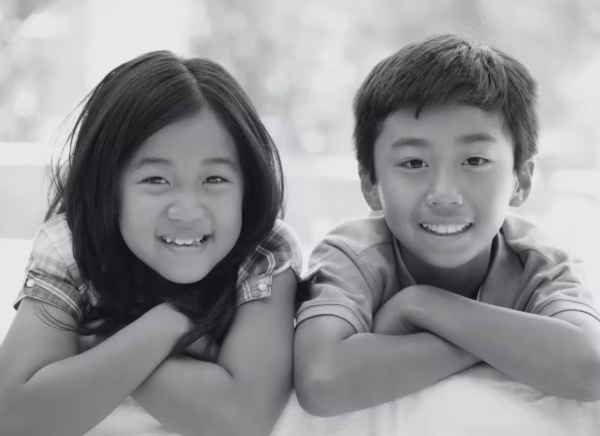
Original Korean Sentence
우리 오빠는 멋있어.
Pronunciation Guide
우리 (u-ri) 오빠는 (o-bba-neun) 머싯써 (meo-sit-sseo).
Meaning and Context
우리 (we, our; but ‘my’; in an intimate way for human relationship) 오빠 (older brother for a female) 는 (my topic is my older brother) 멋있 (to be cool) 어 (is; I’m telling you casually).
English Translation
My older brother is cool.
누나
When a male addresses his older sister, he uses the Korean family term 누나 (noona). It’s a respectful yet affectionate word often heard in Korean dramas and daily conversations.
Original Korean Sentence
누나가 화장을 하고 있어요.
Pronunciation Guide
누나가 (noo-na-ga) 화장을 (hwa-jang-eul) 하고 (ha-go) 잇써요 (it-sseo-yo).
Meaning and Context
누나 (older sister for a male) 가 (my subject is my older sister) 화장 (makeup) 을 (my object is makeup) 하 (to do) 고 있 (~ing) 어요 (is; I’m telling you polite and friendly).
English Translation
My older sister is doing her makeup.
Literal Translation
(My) older sister is doing makeup.
언니
For females, the Korean term for family used to address an older sister is 언니 (unnie). It’s not only a family term but also a common way to address older female friends.
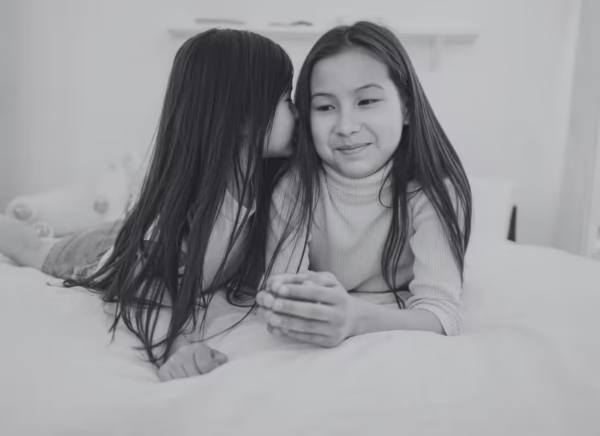
Original Korean Sentence
어제 언니랑 싸웠어.
Pronunciation Guide
어제 (eo-je) 언니랑 (eon-ni-rang) 싸웟써 (ssa-wot-sseo).
Meaning and Context
어제 (yesterday) 언니 (older sister for a female) 랑 (with) 싸우 (to fight) 었 (past tense) 어 (I’m telling you casually).
Pronunciation Patterns for Conjugations
⊳ 우 + 었 = 웠
When rapidly pronounced, ‘우’ and ‘었’ naturally combine to form ‘웠’.
English Translation
I fought with my older sister yesterday.
Literal Translation
(I) fought with older sister yesterday.
동생
The word 동생 (dongsaeng) is a versatile Korean family term used for younger siblings of either gender. To specify, you can add 남 (nam) for younger brother or 여 (yeo) for younger sister.
Original Korean Sentence
내 동생은 말썽꾸러기예요.
Pronunciation Guide
내 (nae) 동생은 (dong-saeng-eun) 말썽꾸러기예요 (mal-sseong-ggu-reo-gi-ye-yo).
Meaning and Context
내 (my) 동생 (younger sibling) 은 (my topic is my sibling) 말썽꾸러기 (troublemaker; is often used to describe children who misbehave) 예요 (is; I’m telling you polite and friendly).
English Translation
My sibling is a troublemaker.
Literal Translation
My younger sibling is troublemaker.
아들
The Korean term for family word for son is 아들 (adeul). It’s a simple, essential word when talking about family members in Korean.
Original Korean Sentence
우리 아들은 초등학교, 삼학년이에요.
Pronunciation Guide
우리 (u-ri) 아드른 (a-deu-reun) 초등학꾜 (cho-deung-hak-ggyo), 삼학녀니에요 (sam-hak-nyeo-ni-e-yo).
Meaning and Context
우리 (we, our; but ‘my’; in an intimate way for human relationship) 아들 (son) 은 (my topic is my son) 초등학교 (elementary school), 삼학년 (third grade) 이에요 (is; I’m telling you polite and friendly).
English Translation
My son is in the third grade.
Literal Translation
My son is in third grade (of) elementary school.
딸
In Korean terms for family, the word for daughter is 딸 (ddal). Short and easy to remember, this is a key part of Korean family vocabulary.
Original Korean Sentence
내 남편은 딸을 정말 사랑해요.
Pronunciation Guide
내 (nae) 남펴는 (nam-pyeo-neun) 따를 (dda-reul) 정말 (jeong-mal) 사랑해요 (sa-rang-hae-yo).
Meaning and Context
내 (my) 남편 (husband) 은 (my topic is my husband) 딸 (daughter) 을 (my object is our daughter) 정말 (very much) 사랑하 (to love) 해요 (I’m telling you polite and friendly).
Pronunciation Patterns for Conjugations
⊳ 하 is changed to 해
English Translation
My husband loves our daughter very much.
Literal Translation
My husband love daughter very much.
Parents often use terms like “우리 딸” (uri ddal – “our daughter”) as a loving phrase.
Extended Korean Family Terms
- Maternal Grandmother: 외할머니 (oehalmeoni)
- Paternal Grandmother: 할머니 (halmeoni)
- Maternal Grandfather: 외할아버지 (oeharabeoji)
- Paternal Grandfather: 할아버지 (harabeoji)
- Maternal Aunt: 이모 (imo)
- Paternal Aunt: 고모 (gomo)
- Maternal Uncle: 외삼촌 (oesamchon)
- Paternal Uncle: 삼촌 (samchon)
Cousins
Cousins are referred to by age and gender, similar to siblings.
And more Korean words for Family Members In-Laws and Spouses
- Mother-in-Law: 시어머니 (syeomeoni) for husband’s mother, 장모님 (jangmonim) for wife’s mother.
- Father-in-Law: 시아버지 (siabeoji) for husband’s father, 장인어른 (jangineoreun) for wife’s father.
- Spouse: 남편 (nampyeon) for husband, 아내 (anae) for wife.
Special Korean terms for family in Korean Culture
Korean culture emphasizes age and hierarchy, and specific terms reflect this.
Hyeong, Noona, Oppa, and Unnie
These sibling terms (older brother/sister) are commonly used outside family as well, indicating camaraderie or respect among friends.
Honorifics and Politeness in Korean Family Terms
Honorifics in family members in Korean uphold the cultural respect for elders. Adding “님” (nim) signifies extra respect, especially for in-laws.
From My Original Story Style Breakdown™ — A New Way to Truly Understand Korean
This is just one sentence from a complete learning system you won’t find anywhere else. — designed to help you understand Korean naturally, without getting lost in grammar rules.
When you can truly understand Korean sentences this way, speaking becomes much easier.
🟡 Sentence 1 of 7

Original Korean Sentence
사자가 코끼리를 잡아요.
Pronunciation Guide
사자가 (sa-ja-ga) 코끼리를 (ko-ggi-ri-reul) 자바요 (ja-ba-yo).
Meaning and Context
사자 (lion)
→ The lion — the one taking action now in the story.
가 (subject marker)
→ Points out that the lion is doing the action.
코끼리 (elephant)
→ The one the action is done to.
를 (object marker)
→ Shows that the elephant is the object being caught.
잡 (to catch, grab, take)
→ The action — the lion catches or grabs the elephant.
아요 (polite ending)
→ I’m telling you this in a polite and friendly way.
Real-Life Usage
잡아요 is common when talking about catching or holding something.
English Translation
The lion catches the elephant.
Literal Translation
Lion catch elephant.
Pattern Practice
사자가 토끼를 잡아요.
고양이가 쥐를 잡아요.
아이가 공을 잡아요.
강아지가 장난감을 잡아요.
In my full Story Course, each sentence comes with even more — depending on the sentence, you’ll also find grammar tips, pronunciation flow advice, and culture insights to help you truly understand and use Korean.
Start the Free Course
Still wondering how to read Korean?

This isn’t just another beginner lesson. It’s a complete system designed to change the way you think about Korean — from struggling with letters to reading real sentences, understanding the language, and speaking out loud with confidence.
Start the Story Course
Looking for super easy way to learn Korean?

Most Korean courses stop at grammar. Mine goes beyond — with stories, Story Style Breakdown™, and real practice to help you speak.
Free Korean Flashcard
FAQs (What You Might Still Wonder About)
1. ❓Formal vs. Informal Use of Korean Terms for Family
In formal settings, like family gatherings or when addressing elders, the formal language is essential. Among friends and younger family members, the casual language is acceptable.
2. ❓Adopted Korean Family Words in Modern Korean Society
With changing family structures, adopted and stepfamily terms are evolving, often blending Western influences with Korean traditions. Terms like “입양아” (ibyang-a – adopted child) are becoming more recognized.
3. ❓Korean Terms for Family in Everyday Life
In daily conversations, phrases like “우리 아빠” (uri appa – “our dad”) or “어머니께서 말씀하셨어요” (eomeoni kkeseo malsseumhasyeosseoyo – “my mother said”) are commonly used. The possessive form “우리” (uri – our) emphasizes closeness.
4. ❓Common Cultural Expressions Involving Family
Expressions like “형님!” (hyeongnim) add respect to the term for older brother, used beyond family to show respect among friends and coworkers.
5. ❓Respect for Elders and Family Hierarchy in Korea
Korean culture places a strong emphasis on family hierarchy. Elders are always addressed respectfully, and younger members are expected to show deference.
6. ❓How to Address Elders and Younger Family Members
For addressing elders, use formal speech, while addressing younger members can be casual. Titles like 할아버지 (harabeoji – grandfather) or 삼촌 (samchon – uncle) carry inherent respect.
7. ❓Korean Family Terms in Korean Media and Culture
Korean dramas often use terms like “오빠” (oppa) to show romance or close friendships. Watching K-dramas is a great way to understand family terms in context.
6. ❓Learning Family Members in Korean: Tips and Tricks
Start by memorizing terms for immediate family and build from there. Watching Korean content or practicing with a language partner helps reinforce these terms.
Final words
Understanding Korean terms for family opens up a window to the heart of Korean culture, reflecting values of respect, hierarchy, and closeness.
These Korean family words are a foundation not only for language learners but for anyone wanting to appreciate the strong family bonds that shape Korean society.
